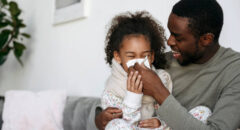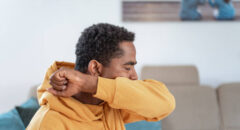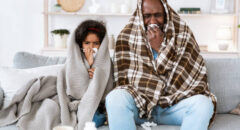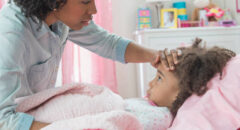
Coming down with the flu this season may not be the worst thing to expect, especially if you care for a small child or elderly adult. Respiratory syncytial virus (RSV) is a contagious seasonal virus. It causes infections of the lungs and respiratory tract that often hospitalizes infants and adults more than the common flu per year. The virus can lead to bronchitis and pneumonia. It is the most common cause of lower respiratory tract infections among young children in the United States and worldwide. Most infants are infected before 1 year of age, and virtually everyone gets an RSV infection by 2 years of age.
Each year, on average, in the United States, RSV leads to
- 57,527 hospitalizations among children younger than 5 years old;
- 2.1 million outpatient visits among children younger than 5 years old; and
- 177,000 hospitalizations and 14,000 deaths among adults older than 65 years.
RSV affects black babies in particular, states Susanne Tropez-Sims, MD in a recent essay. "Black babies are more likely than white babies to be born prematurely. And they are more likely to encounter the risk factors associated with RSV, such as low rates of breastfeeding, crowded living conditions, and contact with school-aged siblings and environmental pollutants. Without access to preventative RSV treatment, black babies face these risks unprotected. As a result, too many will also face RSV."
Symptoms
- Mild cold-like signs and symptoms
- Congested or runny nose
- Dry/Severe cough
- Wheezing
- Sore throat
- Mild headache
- Nausea
- High fever
- Shallow breathing
- Loss of appetite
- Low energy
- Irritable
- Middle ear infection
RSV In Infants
RSV infection can cause a variety of respiratory illnesses that sometimes cause fever. RSV infection most commonly causes a cold-like illness, but can also cause bronchitis, croup, and lower respiratory infections like bronchiolitis and pneumonia. Of every 100 infants and young children with RSV infection, 25% to 40% will show signs of pneumonia or bronchiolitis. Premature infants, very young infants, and those with chronic lung or heart disease or with weakened immune systems have a greater chance of having a more severe infection such as a lower respiratory tract infection. Infection without symptoms is rare among infants.
Infants with a lower respiratory tract infection typically have a runny nose and a decrease in appetite before any other symptoms appear. Cough usually develops 1 to 3 days later. Soon after the cough develops, sneezing, fever, and wheezing may occur. In very young infants, irritability, decreased activity, and apnea may be the only symptoms of infection.
Most otherwise healthy infants who are infected with RSV do not need hospitalization. Those who are hospitalized may require oxygen, intubation, and/or mechanical ventilation. Most improve with supportive care and are discharged in a few days.
RSV In Adults
Symptomatic RSV infections may occur in adults, particularly in healthcare workers or caretakers of small children. Disease usually lasts less than 5 days, and symptoms are usually consistent with an upper respiratory tract infection and can include a runny nose (rhinorrhea), sore throat (pharyngitis), cough, headache, fatigue, and fever, but some high-risk adults, such as those with certain chronic illnesses or immunosuppression, may have more severe symptoms consistent with a lower respiratory tract infection, such as pneumonia.
Testing & Treatment
Several different types of laboratory tests are available for diagnosis of RSV infection. Rapid diagnostic assays performed on respiratory specimens are available commercially. RT-PCR assays are also available for RSV. Use of highly sensitive RT-PCR assays should be considered, particularly when testing older children and adults because they may have low viral loads in their respiratory specimens.
The recovery period typically lasts between 8 to 15 days. In extreme cases RSV can be life threatening. Any patient showing any of the symptoms should see their primary care provider immediately. It is very important that patients, particularly those with existing respiratory concerns be seen by a health care professional as the illness may become life threatening. Hospitalization may be required depending on severity.
Always seek immediate medical attention if breathing becomes difficult.
Prevention
The RSV virus can remain alive on various surfaces, particularly the hands for as long as 13 minutes. The CDC recommends the following five ways to help protect your child(ren) or yourself from RSV:
- Avoid close with sick people.
- Wash your hands often.
- Cover your coughs and sneezes.
- Avoid touching your face with unwashed hands.
- Stay home when you're sick.
In addition, washing and sanitizing toys, not sharing eating utensils and not smoking are advised.
For more information, visit the NMA RSV page.









